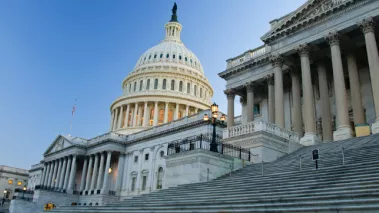Table of Contents
Congress’ Higher Education Act reauthorization tackles campus free speech and due process

Today, the House Education and Workforce Committee’s Republican members introduced legislation called the PROSPER Act to reauthorize the Higher Education Act. In a positive development, the legislation includes provisions on free speech, free association, and due process on campus.
For those unfamiliar with the HEA, it is the landmark federal law that tackles all things higher-education-related, from financial aid to reporting of campus crime statistics under the Clery Act.
Positive aspects of the bill include a provision helpfully declaring that “free speech zones and restrictive speech codes are inherently at odds with the freedom of speech guaranteed by the First Amendment of the Constitution.” While not binding on institutions, it adds that no institution of higher education that receives federal funds “should restrict the speech of such institution’s students through such zones or codes.’’ The bill also requires institutions receiving federal funds to annually disclose “to current and prospective students any policies held by the institutions related to protected speech on campus, including policies limiting where and when such speech may occur.”
FIRE is happy that Congress is thinking about ways it can promote free speech on campus. We are hoping we can work with legislators to strengthen the section on campus free speech to eliminate unlawful speech codes once and for all.
Another issue that the PROSPER Act addresses is discrimination against religious student organizations that wish to define themselves by requiring their members and leaders to adhere to their sincerely held beliefs and values. In well-intentioned, but misguided, attempts to address discrimination, some institutions have enacted policies requiring all student organizations to allow all students to be members or hold leadership positions in their student groups. This clearly makes sense for organizations like the intramural chess club or the hiking club, but makes less sense when applied to groups that are defined by their beliefs. Is the campus Hillel really a Jewish organization if it must allow Christians, Muslims, atheists, and people of other faiths to join or even hold positions of leadership? Does it really make sense that the College Democrats should be required to allow Republicans in their ranks? FIRE welcomes this provision, which would address this problem, but we would like to see the language expanded to protect all belief-based student organizations, not just religious ones.
The legislation has two more sections of particular interest to FIRE. In a section dedicated to improving how institutions address campus sexual assault, the bill would require that institutions periodically conduct climate surveys, provide confidential counseling for survivors, and notify complainants of their reporting options and interim protections available to them while the investigations and adjudications are pending. The legislation also seeks to simplify how victims are advised of the rights and resources available to them at the institution. Importantly, the legislation also strongly encourages schools to enter into comprehensive memoranda of understanding with local law enforcement agencies so that all appropriate governmental resources are brought to bear on addressing allegations.
Another common-sense provision in the bill is one allowing institutions to pause their investigations at the request of law enforcement. This provision is noteworthy in two regards. First, it does not prevent institutions from providing resources and interim protections while a campus investigation is temporarily paused. Second, it recognizes that campus investigations into sexual assault allegations can compromise the integrity of law enforcement investigations, which in turn can compromise the ability of prosecutors to obtain convictions. Prioritizing professional investigations by trained law enforcement experts could increase the chances that violent offenders will get the punishment they deserve: imprisonment.
The bill addresses due process, too. It would allow institutions to set their own standard of evidence, require that all parties get access to all material evidence at least a week before any adjudication, and require that adjudications and investigations be “carried out free from conflicts of interest by ensuring that there is no commingling of administrative or adjudicative roles.”
Reading the sections on campus sexual assault and due process together, it is clear that the Republican members of the Education and Workforce Committee are seeking to be mindful of the rights of victims of sexual assault and the accused alike. Although some victims’ rights advocates may disapprove of statutorily allowing institutions to set their burdens of proof, the bill undeniably includes provisions designed to prevent sexual assault and help victims get the help they need when it does occur. Similarly, while additional procedural protections are necessary for these proceedings to be truly fair to all — for example, the right to active assistance of counsel, and a guarantee of some form of meaningful cross-examination of witnesses — the provisions included in the PROSPER Act would be meaningful, welcome additions to federal law.
One thing to keep in mind about the bill’s introduction is that this is just the first step in the legislative process. FIRE is pleased that the Education and Workforce Committee is working to address so many of our concerns, and we look forward to communicating with the Committee about ways it can be improved upon.
Recent Articles
Get the latest free speech news and analysis from FIRE.

Why FIRE is suing Secretary of State Rubio — and what our critics get wrong about noncitizens’ rights


LAWSUIT: FIRE challenges unconstitutional provisions Rubio uses in crusade to deport legal immigrants over protected speech
